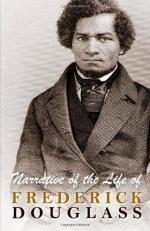CHAPTER IX
I have now reached a period of my life when I can give dates. I left Baltimore, and went to live with Master Thomas Auld, at St. Michael’s, in March, 1832. It was now more than seven years since I lived with him in the family of my old master, on Colonel Lloyd’s plantation. We of course were now almost entire strangers to each other. He was to me a new master, and I to him a new slave. I was ignorant of his temper and disposition; he was equally so of mine. A very short time, however, brought us into full acquaintance with each other. I was made acquainted with his wife not less than with himself. They were well matched, being equally mean and cruel. I was now, for the first time during a space of more than seven years, made to feel the painful gnawings of hunger—a something which I had not experienced before since I left Colonel Lloyd’s plantation. It went hard enough with me then, when I could look back to no period at which I had enjoyed a sufficiency. It was tenfold harder after living in Master Hugh’s family, where I had always had enough to eat, and of that which was good. I have said Master Thomas was a mean man. He was so. Not to give a slave enough to eat, is regarded as the most aggravated development of meanness even among slaveholders. The rule is, no matter how coarse the food, only let there be enough of it. This is the theory; and in the part of Maryland from which I came, it is the general practice,—though there are many exceptions. Master Thomas gave us enough of neither coarse nor fine food. There were four slaves of us in the kitchen—my sister Eliza, my aunt Priscilla, Henny, and myself; and we were allowed less than a half of a bushel of corn-meal per week, and very little else, either in the shape of meat or vegetables. It was not enough for us to subsist upon. We were therefore reduced to the wretched necessity of living at the expense of our neighbors. This we did by begging and stealing, whichever came handy in the time of need, the one being considered as legitimate as the other. A great many times have we poor creatures been nearly perishing with hunger, when food in abundance lay mouldering in the safe and smoke-house, and our pious mistress was aware of the fact; and yet that mistress and her husband would kneel every morning, and pray that God would bless them in basket and store!
Bad as all slaveholders are, we seldom meet one destitute of every element of character commanding respect. My master was one of this rare sort. I do not know of one single noble act ever performed by him. The leading trait in his character was meanness; and if there were any other element in his nature, it was made subject to this. He was mean; and, like most other mean men, he lacked the ability to conceal his meanness. Captain Auld was not born a slaveholder. He had been a poor man, master only of a Bay craft. He came into possession of all his slaves by marriage;




